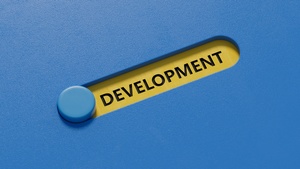

|
Edward Lowton
Editor |


|
| Home> | Industry update | >Company news | >Fostering a culture of lifelong learning |
| Home> | Energy Management | >Compressors & ancillary equipment | >Fostering a culture of lifelong learning |
Fostering a culture of lifelong learning
03 November 2025
LEARNING AND Development (L&D) play a pivotal role in ensuring that engineers remain relevant, competitive, and effective in their professions. Terry Collier, learning and development Officer at the British Compressed Air Society (BCAS) explores the importance of lifelong learning and how the Society is adapting to promote a culture of continuous professional development.

The human brain has an estimated storage capacity equivalent to around one million gigabytes of information: the same as watching 300 years of continuous video. From the moment we are born, our brains are thirsty for knowledge, with children under six able to learn up to 10 new words each day until they reach a staggering average of between 20,00 to 35,000 words in adulthood.
In our professional lives, and according to a 2023 LinkedIn Workplace Learning Report, skill sets for jobs have changed by approximately 25% since 2015 and are expected to change by as much as 65% by 2030.
As humans, there is no doubt we have the ability to learn and adapt. Set these abilities against the backdrop of workplace pressures to be more multi-skilled and more adept than ever before, it's no wonder that continuous learning and development is a high priority for businesses across the country.
Indeed, 58% of professionals say that L&D 'has a seat at the executive table', a 5% rise compared to two years ago.
The importance of continuous professional development (CPD)
Continuous professional development is essential for engineers to adapt to technological advancements, meet industry requirements, and enhance their careers. Many industries require engineers to demonstrate ongoing professional development to maintain appropriate licenses, with CPD qualifications providing evidence of high quality and safety standards.
In the compressed air sector alone, AI technologies are bringing a new dimension to system control and traditional service regimes are being enhanced with predictive maintenance. Compressors, the workhorses of many a production plant, are becoming more efficient, with fewer moving parts and an emphasis on energy reduction.
These advances in engineering bring with them a range of training challenges. Engineers must update their skills regularly to use new software and methodologies effectively, while changing industry standards mean that continuous leaning is essential to maintain compliance and competence.
Elsewhere, investing in on-the-job training is proven to reduce the likelihood of errors, enhancing overall operational efficiency.
But it is not only the employer that benefits from a well-trained, highly skilled workforce. Upskilling often results in higher salaries and equips engineers to transition into other roles and adapt to industry changes, alongside the softer benefits of personal reward and a sense of achievement.
Adapting to a changing learning environment
During Covid, the entire learning community went online, with providers quick to convert previous face-to-face training courses to suit digital learning. This experience proved that fully remote courses could often achieve the same learning outcomes as before, without any compromise in quality. However not all training suits a computer-screen environment, especially that which requires delegates to learn by ‘doing’ rather than by ‘seeing’, meaning the effectiveness of some courses was compromised.
BCAS had already adopted a blended approach to training, combining both remote learning with classroom sessions and has continued to apply this methodology. Some shorter courses are online only, allowing engineers to train at a place, and pace that fits around their work schedule. Others combine in-person training with online support materials where subject matter is more technically complex.
Meeting the demand for continuous learning
BCAS has continued to adapt its training offer to ensure that courses not only remain technically relevant in a changing industrial workplace but provide meaningful support for engineers keen to improve their skills and competence.
In July, this saw the Society join The Society of Operations Engineers (SOE). By partnering with SOE, BCAS training courses will now benefit from formal accreditation, helping to boost the credibility of BCAS training and provide recognised pathways for engineers to progress professionally.
As part of the partnership, professionals completing eligible BCAS training programmes will be able to achieve the EngTech postnominal recognition from SOE, validating their technical competence and commitment to continued learning.
This joint initiative will further reinforce the value of skills development and professional recognition in the engineering community.
Other recent accomplishments for BCAS include the development of a specific Level 3 NVQ tailored for the engineering industry, which has been recognised for the Construction Skills Certification Scheme (CSCS) card alongside being nominated as an international finalist in the E-Assessment Awards in the best workplace and best talent assessment project categories. BCAS is also developing new units for its proven Diploma in Compressed Air Management (DipCam) qualification, which are set to launch by the end of Summer 2025.
BOXOFF
SOE Viewpoint: The importance of CPD for engineers
Continuous professional development (CPD) is increasingly vital in engineering. According to the Engineering Council UK, based on findings commonly cited by professional engineering bodies in the UK, over 80% of engineers agree that CPD helps them remain up-to-date and effective in their roles
In today’s digital landscape, experienced engineers face rapid technological change and must continually update their skills to stay relevant. Meanwhile, younger entrants benefit from hands-on, on-site experience to bridge the gap between theory and practice. Both groups have distinct, but equally important CPD needs, ensuring a competent and future-ready workforce.
It is also important to remember all aspects of the UK Spec when considering CPD. Maintaining ‘competence’ requires a wide range of ever evolving skills aside from just the technical expertise, such as soft skills like leadership, communication, and project management alongside digital literacy, sustainability, AI, cybersecurity, and data analysis - all reflecting the changing demands of the industry.
Staying aware of these trends helps future-proof your teams’ skills, increase engagement, and make training more flexible and impactful.
Future-proofing business
The UK has a well-established framework for CPD, increasingly delivered via online platforms, making training accessible anytime, anywhere - such as the SOE platform. Supported by professional bodies such as the Engineering Council, SOE and other PRI’s in the UK place a strong emphasis on structured CPD and post-nominal recognition and most commentators suggest the UK is ahead in formal CPD requirements. However there is always room to evolve, especially to address digital transformation and sustainability, as mentioned above.
Post-nominals (such as CEng, IEng, or EngTech) are more than just letters after a name, and maintenance of these requires ongoing learning and development.
For individuals, they demonstrate a commitment to professional excellence, boost employability, and foster pride in their achievements. For employers, these designations are a clear indicator of technical competence, credibility, and adherence to industry standards and ethics. This recognition can help to win new business, inspire client confidence, and support talent retention. Many companies are now insisting on professional registration as a prerequisite for promotion.
Employers can benefit by embedding a culture of learning, offering flexible training pathways, and supporting mentoring between experienced and younger engineers. This approach helps address the dual challenges of an ageing workforce and attracting new talent. Investing in CPD and training not only ensures compliance but also future-proofs businesses, drives innovation, and enhances employee engagement.
The SOE has published a paper entitled: Why everyone in positions of engineering responsibility should be Eng Tech, I Eng or C Eng.
Supporting CPD isn’t just about compliance; it’s about building a brighter, more resilient future for your team, your business and society.
Sitting alongside CPD, especially for younger engineers, should be development and mentoring programs. Employers should look to challenge willing employees with tasks and projects to aid in their development and progression.
The SOE can help to provide mentors through the mentoring platform, giving support, direction and suggestions to further individual development.
Dominic Dawson is chair of the BES and IPlantE professional sector of the Society of Operations Engineers
Tel: 0207 935 2464
- Ensuring workplace safety with compressed air
- Lowering compressed air cost of ownership through maintenance
- BCAS launches first 50 Hz compressor verification programme in Europe
- BCAS: GB/UK legislation update
- BCAS appoints Steven Rohan as new president
- Improving compressed air practices to cut energy wastage
- Setting the standard - raising the bar
- Determining new supplier partnerships
- Standards and Codes of Practice
- New standard targets energy performance




















